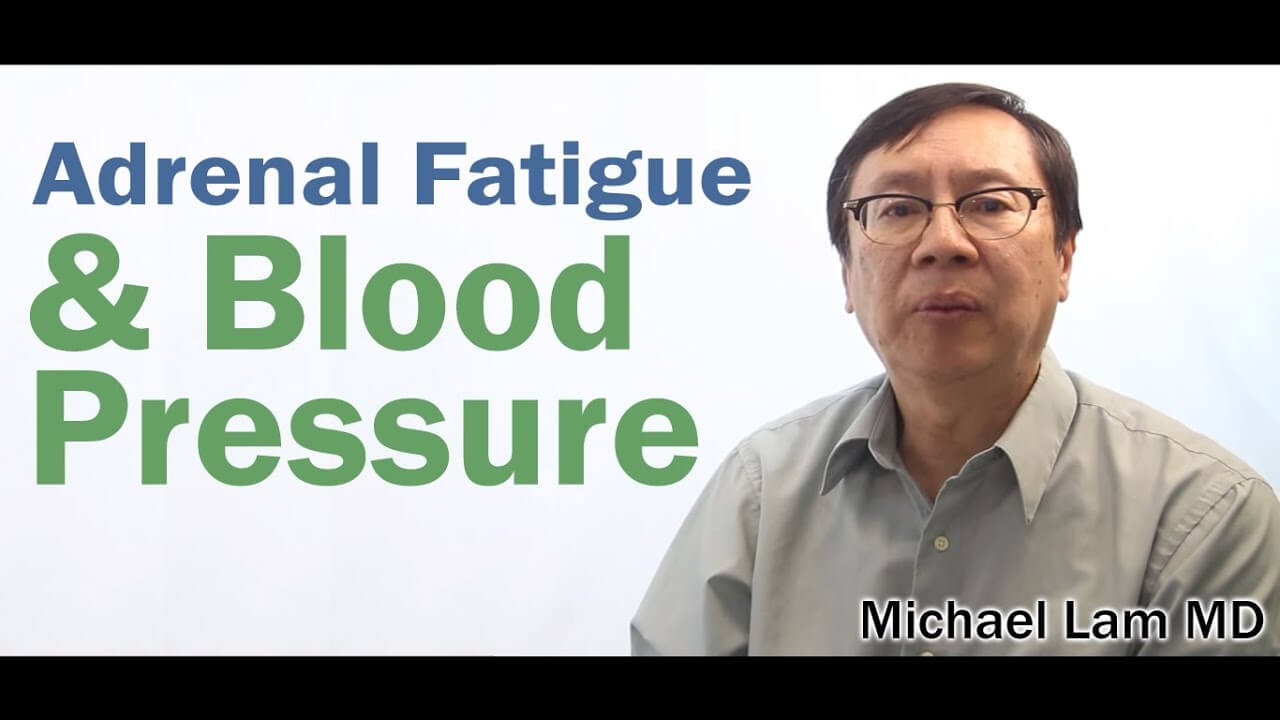
Although hypertension, or high blood pressure, is sometimes referred to as a “silent killer” because of its supposed lack of symptoms, if you pay attention, you can catch them early. There are underlying causes for both hypertension and blood pressure symptoms, and these causes should be addressed so that you can maintain or improve your cardiovascular health.
» Read our complete long-read article on Adrenal Fatigue and blood pressure symptoms
» Adrenal Fatigue FAQs
» Take our 3-minute test to see if you may have Adrenal Fatigue
Your cardiovascular system, along with your autonomic nervous system (ANS), and adrenal glands are part of your Cardionomic Circuit. This circuit is one of the six of your NeuroEndoMetabolic (NEM) Stress Response, which is your body’s global response to stress. The reason we’ll be looking at your NEM and its Cardionomic Circuit is because blood pressure symptoms and problems are common when these systems dysregulate.
The other five circuits are the Hormone, the Bioenergetics, the Neuroaffect, the Inflammation, and the Detoxification circuits. All of these get involved when your body is facing stress, and all of them can contribute to blood pressure issues. For example, the Hormone Circuit shares the adrenal glands with the Cardionomic Circuit. The Adrenals are your NEM’s first responders, as they produce some of the most important stress hormones, including cortisol, adrenaline, and norepinephrine.
All three of these hormones will have an effect on your heart and cardiovascular system. They can speed up your heart rate, make your heart pump blood faster and harder, and change your blood pressure. All this is in an effort to help your body respond to stress, for example through the “fight or flight” response. If you recall a moment when you were suddenly faced with a stressful situation, you may have noticed your heart pounding. That’s the work of these hormones.
 Before we get into the details of what conditions affect your blood pressure and what to do about them, here are some high blood pressure symptoms to look out for:
Before we get into the details of what conditions affect your blood pressure and what to do about them, here are some high blood pressure symptoms to look out for:
As you can see, these symptoms can be pretty serious, and that’s because they usually come about during a high blood pressure crisis. That’s when your blood pressure is close to or over 180/120 mm Hg. But even 140/90 mm Hg is considered hypertension, with 120/80 mm Hg and up considered at risk (prehypertension). And it’s usually very difficult to spot blood pressure symptoms for 140/90 mm and up unless it gets to a crisis level.
Still, the underlying causes of hypertension can have their own set of symptoms that you can watch out for. And addressing these causes may save you from having to take blood pressure medication. In fact, regulating your blood pressure is not that hard, and it can make a huge difference to your cardiovascular health and the health of your Cardionomic Circuit.
Adrenal Fatigue Syndrome (AFS) is one of the conditions we look at when someone comes to us with unstable blood pressure, whether low or high. It’s the result of facing chronic stress and the subsequent exhaustion of the adrenal glands. The adrenals have to overwork to produce cortisol and other stress hormones to fight that stress. But if the stress is chronic, they can get so overworked that they dysregulate.
Symptoms of AFS include fatigue, sleep problems, weight gain, difficulty losing weight, brain fog, anxiety, mild depression, hair loss, dry skin, loss of libido, PMS, infertility, hypoglycemia, salt and sugar cravings, lowered immunity, food and drug sensitivities, estrogen dominance, unstable blood pressure, heart palpitations, cardiac arrhythmia, POTS-like symptoms, and atrial fibrillation.
The last few symptoms are, in fact, due to how dysregulated adrenals affect the NEM’s Cardionomic Circuit. As the adrenals start to produce either too much or too little stress hormones, that has an impact on the cardiovascular system in several ways. And it also affects the nervous system, including the ANS, which is what controls things like blood vessel constriction and heart rate.
Generally speaking, the ANS and cardiovascular system portions of the Cardionomic Circuit are on hold when your stress is mild. But once it’s severe and your adrenals are exhausted, their cortisol output drops. This is stage 3 of AFS, or what’s sometimes called adrenal exhaustion. And it’s when those other components kick into gear in an effort to compensate for the loss of adrenal output.
But even then, there is a high likelihood that these two components will become dysfunctional as they face the same stress that took out your adrenals. Let’s take a closer look at how this progression affects your blood pressure.
 The first stage of Cardionomic Circuit Dysfunction has to do with the adrenal component and cortisol output. This is where you can start to notice high blood pressure symptoms, such as heart pounding, dizziness, and breathlessness.
The first stage of Cardionomic Circuit Dysfunction has to do with the adrenal component and cortisol output. This is where you can start to notice high blood pressure symptoms, such as heart pounding, dizziness, and breathlessness.
After cortisol is increased, the sympathoadrenal hormone system of the ANS gets activated. This is the system that regulates adrenaline and norepinephrine. When these hormones are out of balance, more problematic cardiovascular symptoms appear, such as subclinical POTS (postural orthostatic tachycardia syndrome).
If the dysfunction progresses further, it can damage the cardiac nodes, which regulate the heartbeat. This can lead to more specific blood pressure symptoms, such as postural hypotension, where you get a sudden drop in blood pressure upon standing up. You can also get atrial fibrillation and idiopathic supraventricular tachycardia.
And as the Cardionomic Circuit dysregulates more, the severity and frequency of such symptoms increase, as well as damage to the heart and blood vessels. You can also see full-blown POTS, panic attacks, and severe insomnia. It’s possible to end up bedridden with a lot of cardiac damage.
This progression usually happens over long stretches of time – months or even years. That’s why it might be difficult to spot. You might think your blood pressure symptoms are due to something else. Some common risk hypertension factors include diabetes, obesity, a sedentary lifestyle, smoking, kidney disease, lupus, hyper or hypothyroidism, Cushing’s syndrome, scleroderma, and obstructive sleep apnea. Pregnant women can get preeclampsia, but that is more of an acute issue.
The above risk factors can themselves be a cause of NEM, and therefore Cardionomic Circuit, dysfunction. They are a source of chronic stress on the adrenals and the other stress response organs and systems. And NEM dysregulation and AFS can worsen these conditions as well.
So blood pressure symptoms are not a stand-alone problem. Even just one of the underlying causes is not a stand-alone problem. The key here is to look at the entire picture. And the best way to do that is to enlist the help of a health professional that practices a more holistic approach to medicine.
This is especially the case if one of your underlying conditions is AFS or NEM dysregulation. That’s because, first of all, these conditions are not yet recognized by mainstream medicine and don’t have reliable lab tests. They require special expertise. The health professional will look at your medical history, your lifestyle, and your symptom picture. They will also look to rule out other possible conditions that have similar symptoms.
Then, they will create an individual recovery plan for you that takes into accounts all of these factors. This recovery plan’s aim isn’t just about reducing your blood pressure symptoms, but about addressing the root causes of your blood pressure issues and improving your overall health.
 Your recovery plan will include some combination of the following components.
Your recovery plan will include some combination of the following components.
You’ll want to take up what’s called a “heart healthy diet” that prioritizes fruits, vegetables, lean proteins, and whole grains. You might want to reduce your meat consumption and also your salt intake. If you have AFS, the adrenal fatigue diet combines all of these factors and is also adjusted for maximum adrenal fatigue recovery. It will be anti-inflammatory and good for your gut microbiome. Plus, it requires that your meals be timed at specific intervals so that you don’t experience hypoglycemic episodes or energy deficiencies.
As for exercise, it’s a little trickier, depending on whether you have AFS and NEM dysregulation or not. For the most part, cardio-type exercises are the best for your heart and blood pressure, but they are too much for your adrenals. If you have AFS, especially the more advanced stages, you’ll need to start with very gentle forms of exercise, such as adrenal breathing and adrenal yoga. You can then increase the intensity as you recover.
Reducing and managing stress is often recommended for your cardiovascular health. Now you have a more detailed idea of the physiological processes that link the two. The fact that stress activates your ANS and leads to hormonal imbalances that cause cardiac symptoms hopefully shows how important it is to reduce your stress – whether it’s mental or physical.
Physical stressors include eating a bad diet, a sedentary lifestyle, or having a chronic condition that needs to be better managed. They also include exposure to toxins, drinking too much alcohol, taking certain medications, smoking, and lack of sleep. Being overweight is a huge stressor and one of the biggest contributors to blood pressure symptoms. But, taking up a healthy and gradual form of weight loss that does not add stress is also important.
In some cases, you might need to take medications and supplements that reduce your blood pressure. This could also happen if the above measures didn’t make enough of a difference or if you need medication temporarily until these changes take effect. It will all depend on your situation and needs.
Some common blood pressure medications include:
All of these medications carry risks and side effects. And some can cause serious problems for those with certain conditions, such as kidney problems or heart disease. That’s why it’s better to prioritize the more natural methods of reducing blood pressure symptoms and only use medication as a last resort.
Some common natural blood pressure supplements include:
Don't take blood pressure supplements without consulting a health care provider as each supplement might have different effects on your body systems and interact with medications. These are just general recommendations and are not meant as remedies to be taken alone or without talking to your doctor. Also, you should still try to find the root cause of your high blood pressure.
 Blood pressure instability, especially high blood pressure, is not a condition in and of itself. It is a symptom of something else that went wrong. Sometimes, it can have several underlying causes. So it makes no sense trying to reduce blood pressure symptoms without addressing these root problems.
Blood pressure instability, especially high blood pressure, is not a condition in and of itself. It is a symptom of something else that went wrong. Sometimes, it can have several underlying causes. So it makes no sense trying to reduce blood pressure symptoms without addressing these root problems.
These root problems can include other chronic conditions, as well as AFS and Cardionomic Circuit Dysfunction. Thankfully, many of these issues can be addressed and you can reduce your blood pressure naturally and sustainably.
But it will require the support and supervision of an experienced health professional. They will help you create an individualized recovery plan suited to your situation and needs. And they will also help you avoid some common pitfalls. Blood pressure medications should always be a last resort.
If you have any questions about blood pressure symptoms, Adrenal Fatigue, or Cardionomic Circuit Dysfunction, you can contact the Dr. Lam Coaching team. We can offer you a free** no-obligation phone consultation at +1 (626) 571-1234 where we will privately discuss your symptoms and what your options are. You can also send us a question through our Ask The Doctor system by clicking here.
» Read our complete long-read article on Adrenal Fatigue and blood pressure symptoms
» Adrenal Fatigue FAQs
» Take our 3-minute test to see if you may have Adrenal Fatigue
Most of the time, hypertension is asymptomatic. But if you experience these high blood pressure symptoms, you need to see a doctor immediately. They include headaches, nausea, blurry vision, and more. But, thankfully, there’s a natural way to lower and maintain a healthy blood pressure level.